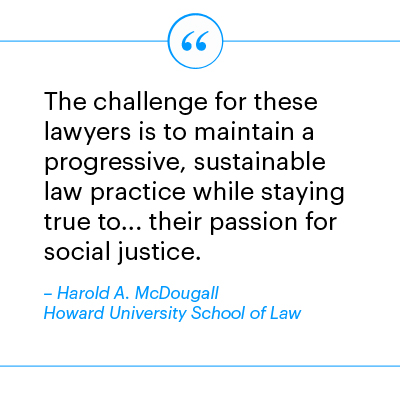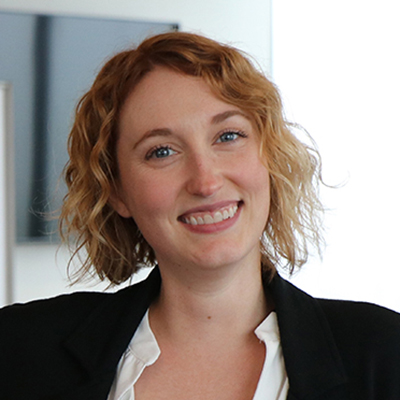BU Law Hosts Conference on Rebellious Lawyering
New England Clinicians Conference sought to rethink how law schools teach students and engage with communities.
Last year, a band of clinical law professors got together to think about how they could work across schools to confront big questions in experiential legal education—how could they use contextual learning to teach students how to think about injustice, to respond to the events of the day, and to support the communities in which they live? This year, those efforts have grown into the Second Annual New England Clinicians Conference, hosted by Boston University School of Law.
 The theme for the weekend was “Rebellious Lawyering: Rethinking how We Teach Students, Practice Law, and Engage Communities.” Presentations and workshops covered topics ranging from race to gender identity, poverty, and migration. Law professors and administrators explored emerging issues in clinical teaching, such as cross-clinic collaboration, interdisciplinary teaching, cultural competency, evolving clinical design, and narrative/storytelling in clinical teaching.
The theme for the weekend was “Rebellious Lawyering: Rethinking how We Teach Students, Practice Law, and Engage Communities.” Presentations and workshops covered topics ranging from race to gender identity, poverty, and migration. Law professors and administrators explored emerging issues in clinical teaching, such as cross-clinic collaboration, interdisciplinary teaching, cultural competency, evolving clinical design, and narrative/storytelling in clinical teaching.
The conference was a collaborative effort for administrators and professors of BU Law’s experiential programs. Associate Dean for Experiential Education Peggy Maisel, Clinical Associate Professor Karen Pita Loor, Clinical Instructor Julie Dahlstrom, and Lecturer in Law Sarah Sherman-Stokes served on the planning committee, while Clinical Associate Professor Naomi Mann, Associate Director for Clinical & Trial Programs Adrienne Smith, and Associate Dean of Student Affairs Gerry Muir organized and participated in panels throughout the weekend.
Conference co-chairs Laila Hlass, BU Law clinical associate professor, and Sherley Rodriguez, Suffolk Law clinical fellow, welcomed attendees at the opening keynote and encouraged them to consider the responsibilities of the rebellious lawyer to marry the practice of law with current events and the pursuit of justice.
Professor Harold A. McDougall, of Howard University School of Law, delivered the keynote address with his son, Harold McDougall IV, an attorney in Los Angeles working in entertainment and intellectual property law. Professor McDougall, who has written several articles on rebellious lawyering, as well as a book, Black Baltimore: A New Theory of Community, about community organization in urban America, focused his talk on how students can become and remain involved in rebellious lawyering and public service after law school.
At the center of this discussion was the idea of ikigai, a Japanese concept about finding a reason for being. Ikigai—the intersection of mission, passion, profession, and vocation—can be achieved by law students interested in social justice law, McDougall said, in a handful of ways. Pro bono work in big law firms is an option, but only to a certain extent. “At the end of the day, it’s still a for-profit corporation,” he said. Teaching law, working for the government, or working for public interest groups are other ways, but most students end up in private practice. The challenge for these lawyers is to maintain a progressive, sustainable law practice while staying true to their ikigai—their passion for social justice.
>> Watch Professor and Mr. McDougall’s keynote address.
Sessions throughout the weekend focused on social justice movements and how practicing attorneys, law school faculty and administrators, and law students can support diversity and equality in the profession, in schools, and in their communities. Faculty and administrators from BC Law, Harvard Law, Roger Williams University School of Law, the University of Massachusetts School of Law, and BU Law explored how they can promote inclusion and justice in law school by supporting student affinity groups and organizations like Black Lives Matter. Actions have included hiring administrators directly responsible for fostering diversity and establishing workshops, round table discussions, and annual conferences to engage students, faculty, and staff in meaningful and ongoing conversations about social justice.
Nadiyah Humber, clinical fellow for Suffolk University Law School’s Housing Discrimination Testing Program, concluded the conference by highlighting important topics discussed throughout the weekend. “A lot of thought-provoking material” was presented, she said, especially regarding ways to change teaching practices through rebellious lawyering. Humber reiterated the importance of Professor McDougall’s focus on ikigai, and highlighted the value of listening by quoting an attendee of last year’s conference: “we should sit down, shut up, and listen.”
